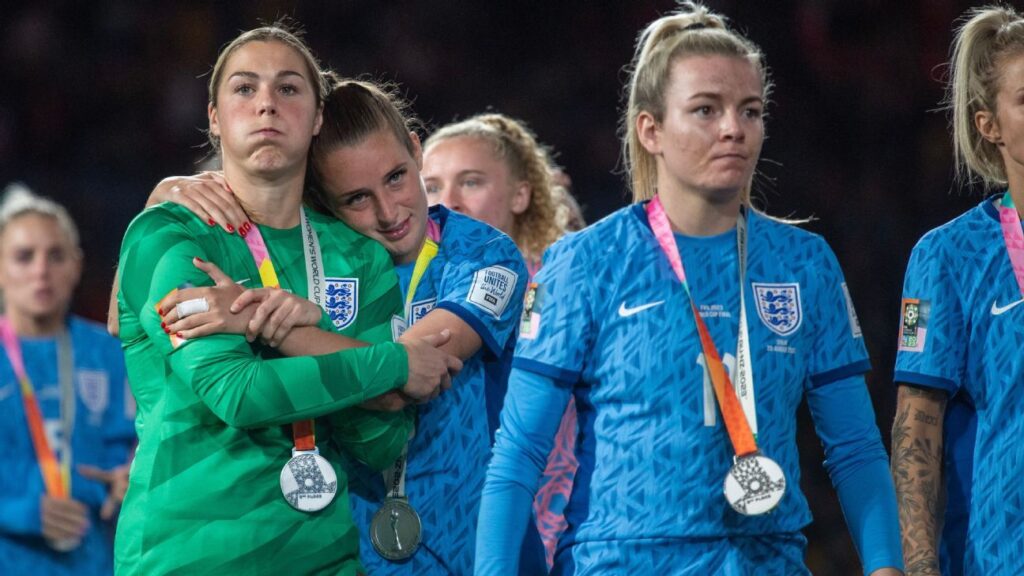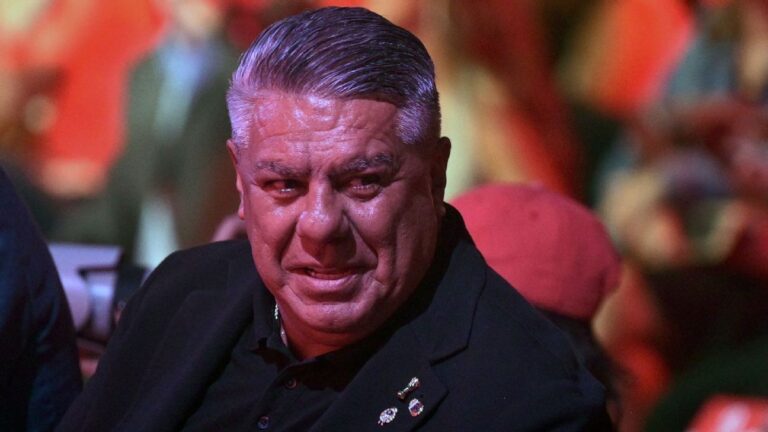SYDNEY — This time the tactical tweaks, replacements and sheer grit weren’t enough to get England across the line. With Spain holding on to their 1-0 lead they so expertly crafted in the 29th minute, the final throw of the dice saw England crowd the opposition’s penalty area for one last corner in the 103rd minute of the match. But unlike last summer, this time there was no Chloe Kelly moment. There was no fairy-tale ending.
As the final whistle blew, Lucy Bronze fell to the floor; she covered her face with her shirt. Beth England bent down to console her. Mary Earps, who had come up for the corner, hunched to her knees back in her own penalty area, the one she had protected for so long. Alex Greenwood stood picking at the bandage on her head, having split her eyebrow open on Salma Paralluelo’s knee. Other players stood looking shell-shocked; for some the tears broke through. It was a scene of desolation.
– Women’s World Cup: Landing page | Schedule | Rosters | News
This time it was the Lionesses who watched on as the other team celebrated. It was “Bamboléo” ringing out around the stadium instead of “Sweet Caroline.”
Eventually pride will shine through, an awareness of what they’ve achieved, but there’s no doubt that the better team won on this chilly night in Sydney. The sights of Spain celebrating will be jarring for this group; they’re just not used to losing. One defeat in 38 matches coming into this is an outstanding record. They’ve got the muscle memory of what to do when their backs are against the wall, the understanding of what coach Sarina Wiegman wants from the group when they’re faced with adversity. They always have a plan to wrest things back in their favour.
But this time the plan didn’t see them home. Whenever England looked to find momentum, Spain would find a way to respond.
England struggled to get a foothold in the match. Spain passed, passed and passed the ball again, dominating the midfield battle and punishing England when the chance allowed. The only goal of the game was a brilliant strike from Olga Carmona, firing into the far corner beyond Earps.
The first half was poor from the Lionesses’ perspective, their best chance coming when Lauren Hemp hit the bar with an effort after 15 minutes. Spain had complete control. Something needed to change.
At half-time, Wiegman rolled the dice, bringing on Lauren James and Kelly for Alessia Russo and Rachel Daly, respectively. She switched from the 3-5-2 that had served them so well against Australia to a back four. It was her boldest call yet as England manager.
The Lionesses saw more of the ball, but the more they attacked, the more Spain found a way to soak up the pressure like a vacuum, suffocating the match as the Lionesses have done on countless occasions.
James had some nice touches in advanced areas, forcing one smart save from Cata Coll, but clear-cut chances were at a premium; Hemp was the only other player who caused a Spanish intake of breath, as she fired wide from close range.
England were in the ascendancy when Spain won a penalty for a Keira Walsh handball. From Walsh’s handball to Jennifer Hermoso taking the penalty, it took five minutes to make the call, with VAR advising referee Tori Penso, who herself took an age at the monitor. Earps — later named the best goalkeeper at this World Cup — pounced off her line to make a brilliant save, but it didn’t give England the necessary impetus to then turn the game around.
“We started playing better, we changed shape, we got momentum. We got more in their half, then they got that penalty and when she saved it, I thought we’d score a goal and get the 1-1,” Wiegman said. “But we didn’t.”
Wiegman’s next attempt to gain the ascendancy saw Beth England replace Ella Toone in the 87th minute, moving James into the middle. As the 90th minute ticked over, Millie Bright moved into a centre-forward role, but England found a way to use her strengths only once in the 13 added minutes.
England never once stopped running, pulling and pressing away at the Spain defence, but there was to be no miracle moment. They grew more desperate, passes didn’t stick to feet, balls down the wing didn’t find a player, and crosses pinged across the box found dead space or Spanish feet. Some of the pre-tournament fears were manifested in those closing moments, as they had struggled to score from open play in the run into the World Cup.
Then came the devastation, the tears and the postmatch reflections. You hope this group find a way to take some solace from their journey to the final.
England’s wait for a second World Cup crown will have to wait. When the men won in 1966, women’s football was banned in the UK. It took a group of pioneers to bring the team back to their rightful stage in 1971. Their names alongside Carol Thomas, Gillian Coultard, Sheila Parker, Lily Parr, Pat Davies, Mary Phillip, Fara Williams, Kelly Smith and Rachel Yankey are the reason this group are here today.
But this group — complete with retired Jill Scott and Ellen White and injured Leah Williamson, Beth Mead and Fran Kirby — have taken the badge on to a new level, a heightened public awareness with an incredibly powerful collective voice and drive to leave a remarkable legacy.
“We’re the Lionesses, so we won’t stop what we’re doing,” Georgia Stanway said afterward. “We’ll continue to break barriers; we’ll continue to push on.”
As Spain started their celebrations, Wiegman brought the Lionesses together in a huddle. She looked at the faces who had celebrated the Euros 13 months before, but this time there were thousand-mile stares.
The coach looked over and saw Earps being helped back to the huddle by some support staff. At the start of the tournament, the Lionesses spoke about this being more than the individual: they are a collective group, in this for one another. As Earps joined the circle, it was only then Wiegman started speaking. “I said to them: It’s hard to take now, we gave everything, we’ve overcome lots of challenges and we did everything we could to win,” Wiegman said. “It feels bad and we’re disappointed, but still we’re very proud of the team.”
England started it together; they’d finish it as one.




